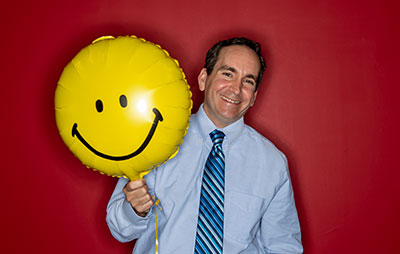Building Habits of Positivity
January 9, 2019By Katie Smith
Scott Glassman, PsyD ’13, associate director, MS in Mental Health Counseling, and clinical assistant professor,
Department of Psychology, is a glass-half-full kind of guy.
 Dr. Glassman is the founder of “A Happier You,” a seven-week program launched at Philadelphia
College of Osteopathic Medicine in January 2017, designed to enhance a person’s optimism,
increase the frequency of positive emotions and, by extension, improve overall health
and well-being.
Dr. Glassman is the founder of “A Happier You,” a seven-week program launched at Philadelphia
College of Osteopathic Medicine in January 2017, designed to enhance a person’s optimism,
increase the frequency of positive emotions and, by extension, improve overall health
and well-being.
“The evidence for positive outcomes is there,” he says. “Expressing gratitude is associated
with less depression, less fatigue, better sleep and greater confidence in caring
for one’s health. Feelings of love activate our brain’s pleasure center through the
release of dopamine, and laughter has even been associated with improved immune system
functioning.”
With the help of Nicole Ryan (PsyD ’20), a fourth-year doctoral candidate in clinical
psychology—sporting a hockey puck–sized button that beams, “Happiness Guide”—Dr. Glassman
has brightened the lives of nearly 100 participants in the course’s seven iterations.
Each week centers on a different blissful tenet, including laughter, strengths and
successes, positivity, gratitude, kindness and love, and equips participants with
tactics for happiness in the real world.
One such class, catering to PCOM employees, came to a close in late September in a
celebration of community, personal growth—and free gifts.
“In honor of our last class,” revealed one participant named Abby, “I brought everyone
umbrellas!” The gesture was a reminder of an earlier act of kindness she offered to
a stranger on a rainy day.
The class began by sharing some examples of kindness from the previous week—the listening
ear of an empathetic friend and Ms. Ryan’s offering a makeup class one-on-one—before
diving into the final topic of love. In their activity books, each decorated to depict
the participant’s “happiness,” the group reflected on someone or something each person
loves and why, and potential ways to express that.
“Loving someone means you start each day with a clean slate,” shared Allana. “It’s
not like I won’t love you on Wednesday as much as I did on Saturday. It’s about acceptance.”
As a closing and a takeaway, Dr. Glassman and his team distributed spinners with each
course tenet as an option, as a way to prompt yourself to look for the positive.
“Do you have an extra spinner?” one participant, Renee, asked. “I need one specifically
for traffic.”
Dr. Glassman’s goal, fostering happier people, is certainly not a hard sell. His methodology
is based in positive psychology and the work of Martin Seligman, PhD, the Fox Leadership
professor of psychology at the University of Pennsylvania, and Dr. Glassman’s former
mentor.
Seligman’s 2002 book Authentic Happiness: Using the New Positive Psychology to Realize
Your Potential for Lasting Fulfillment steps away from the personal states that make
life miserable—that is, mental illness—to focus on building those that make life worthwhile.
“The time has finally arrived for a science that seeks to understand positive emotion,
build strength and virtue, and provide guideposts for finding what Aristotle called
the ‘good life,’ ’’ he writes.
His book dives into positive emotions and how to increase them, while tearing down
the idea that happiness and altruism are inauthentic. Seligman offers three pillars
for positive psychology—positive emotions, traits and institutions—and the relationship
between each as a way to navigate one’s meaning and purpose.
“Some of Seligman’s work focuses on the idea of resilience,” explains Dr. Glassman,
“the ability to reframe negative experiences or emotions in a positive light. Our
weekly evidence-based lessons give students the tools to do that, fostering gratitude
and attention to personal strengths and positive life effects.”
In part, the course codifies these practices through behavioral activation: helping
participants identify and plan meaningful and enjoyable activities that take a person
out of a negative mindset and developing a habit or ritual around them.
Dr. Glassman so strongly believes in sharing the practices of positive psychology
that he and Ms. Ryan facilitate a Facebook group of the same name, offering prompts
to past participants and interested social media users alike. Users share positive
affirmations and answer questions that help them think in positive directions. One
prompt, asking the over 1,000 participants to complete a sentence, reads, “I feel
fulfilled when ____.”
Ms. Ryan, whose thesis explores physician burnout, thinks the program is vital for
members of the PCOM community who feel tapped out. “Burnout can stem from feeling
a lack of control,” she says. “If we accept that through a mindfulness practice, it
becomes easier to find the humor in a situation or take comfort in an act of kindness.”
The pair believe “A Happier You” has implications for employee and human resources
programs, inpatient and outpatient mental health treatment and patients in healthcare
clinics—both at PCOM and throughout the country. The most recent group’s exit survey
reported improved job performance and satisfaction during the seven-week program.
And what about Dr. Glassman, an expert in cultivating these skills in others?
“This class is uplifting,” he says. “It’s a breather. Coming here every week is a
reminder to look at what’s going well, so I keep seeking out the positive in my own
life.”
READ THE FULL ISSUE OF DIGEST

 Dr. Glassman is the founder of “A Happier You,” a seven-week program launched at Philadelphia
College of Osteopathic Medicine in January 2017, designed to enhance a person’s optimism,
increase the frequency of positive emotions and, by extension, improve overall health
and well-being.
Dr. Glassman is the founder of “A Happier You,” a seven-week program launched at Philadelphia
College of Osteopathic Medicine in January 2017, designed to enhance a person’s optimism,
increase the frequency of positive emotions and, by extension, improve overall health
and well-being.